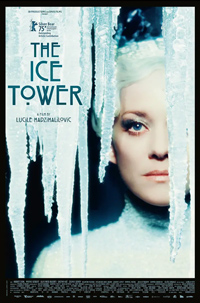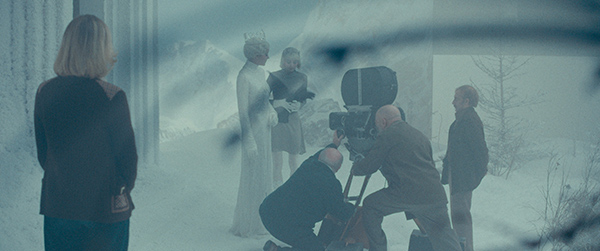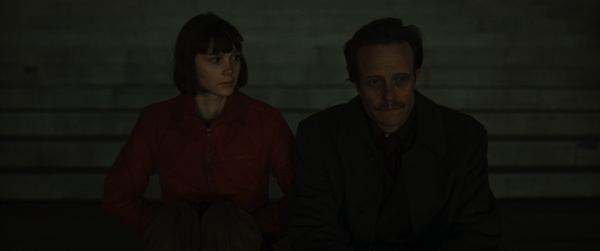Hearts of Glass: Hadžihalilović Casts a Wintry Spell
 A chilly scene of winter unfolds in La Tour de Glace (The Ice Tower) at a glacial pace, content with shattering itself into pieces for those desiring to get anywhere near it. The fourth feature from Lucile Hadžihalilović bears all the earmarks of her previous features, all pregnant with an ambiguous menace while its anxious characters use each other for reasons almost too obscure until it’s too late to avoid something terrible. Her latest venture is a reunion with Marion Cotillard, who headlined Hadžihalilović’s first feature, Innocence (2004), about an all girls’ school where the children are being groomed for a sinister purpose. Notably, she also utilizes her husband, director Gaspar Noe, a background player in this grim identity nightmare on devotion and sacrifice.
A chilly scene of winter unfolds in La Tour de Glace (The Ice Tower) at a glacial pace, content with shattering itself into pieces for those desiring to get anywhere near it. The fourth feature from Lucile Hadžihalilović bears all the earmarks of her previous features, all pregnant with an ambiguous menace while its anxious characters use each other for reasons almost too obscure until it’s too late to avoid something terrible. Her latest venture is a reunion with Marion Cotillard, who headlined Hadžihalilović’s first feature, Innocence (2004), about an all girls’ school where the children are being groomed for a sinister purpose. Notably, she also utilizes her husband, director Gaspar Noe, a background player in this grim identity nightmare on devotion and sacrifice.
Unhappily tethered to a foster home in a small, mountainous village, Jeanne (Clara Pacini) is inspired to flee to the nearest town, locating an ice rink on a postcard she’d been sent. There she sees Bianca, whose lost purse provides Jeanne with a new identity. With nowhere to sleep, she breaks into a building which happens to be a film studio where a production of The Snow Queen, one of her favorite fairy tales, is being shot, starring a renowned actress named Cristina van den Berg (Cotillard). Noticing the young girl has been sleeping at the studio, a relationship develops between them, and Jeanne, now Bianca, becomes part of the cast. But Bianca’s obsession with Cristina, which is clouded by the chilly character she’s portraying, leads them both down a confused, disturbing path.

Hadžihalilović tends to operate on a similar wavelength as Peter Strickland or even Fabrice du Welz, both who play with recycled genre elements to their own distinct ends. What may frustrate many about Hadžihalilović’s film (and her previous filmography) is how she withholds the pulpy payoff of genre, using parameters to create films existing in their own nebulous void. The Ice Tower reveals itself to be along the lines of All About Eve and Daughters of Darkness, where an older woman becomes a mentor to a devoted sycophant even though both seem to have various ulterior motives. But this is not an energetic film by any means as we spend most of the time drifting along with the newly minted Bianca, an intensely vacant Clara Pacini, searching for a substitute maternal figure.

If Pacini’s passivity might hold us captive on a seemingly inert path, Cotillard is equally icy in her split identities as the Snow Queen she is portraying and the bored, unhappy actress Cristina van den Berg, a woman who also reinvented herself anew. Traces of Hitchcock’s Vertigo dance on the periphery as we bounce between the fetishized blonde screen queen and Cristina’s raven haired diva, like Delphine Seyrig vs. a depressed Romy Schneider, supplied with illicit substances by her doctor, a rather grim specter played by August Diehl.
Hadžihalilović also reunites with 2013’s Earwig (read review) scribe Geoff Cox, this time with a narrative arguably more accessible but somehow all the more aloof for it. Likewise, she re-utilizes DP Jonathan Riquebourg, who paints a dimly lit world of shadowy crevices until we get snatches of the film’s troubled production, which comes to life like a shimmery Soviet-era fairy tale. An unpredictable crow, the Snow Queen’s minion, allows Cristina to demand Bianca replace a young actress the finicky bird refuses to act alongside, which seems a nod to Dario Argento’s avian infused Opera (1987).
And like a fairy tale, there’s a fascination with objects, or souvenirs rather, supposedly binding these characters inextricably. A string of blueberry shaped beads, the last vestige of Jeanne/Bianca’s mother, and a plucked crystal from the Snow Queen’s dress unite this newly reconfigured mother/daughter relationship. “We’ll be connected forever,” sighs Cristina before bringing Bianca to an icy precipice in the middle of the night suggesting they disappear forever. And, ultimately, this is where their troubled union is heading, for Cristina, like the Snow Queen, demands a drastic sacrifice. This culmination is depicted in the strangest exchange in The Ice Tower when an uncomfortable kiss brings us closest to the vampiric metaphors constantly suggested. This shoe, if it can be called such, might take too long to drop, but Hadžihalilović’s undeniable command of tone and directorial vision remains impressive. The Ice Tower depicts a cruel, unhappy realm and successfully elicits a corresponding emotional response.
Reviewed on February 16th at the 2025 Berlin International Film Festival (75th edition) – Main Competition. 118 mins.
★★★½/☆☆☆☆☆


